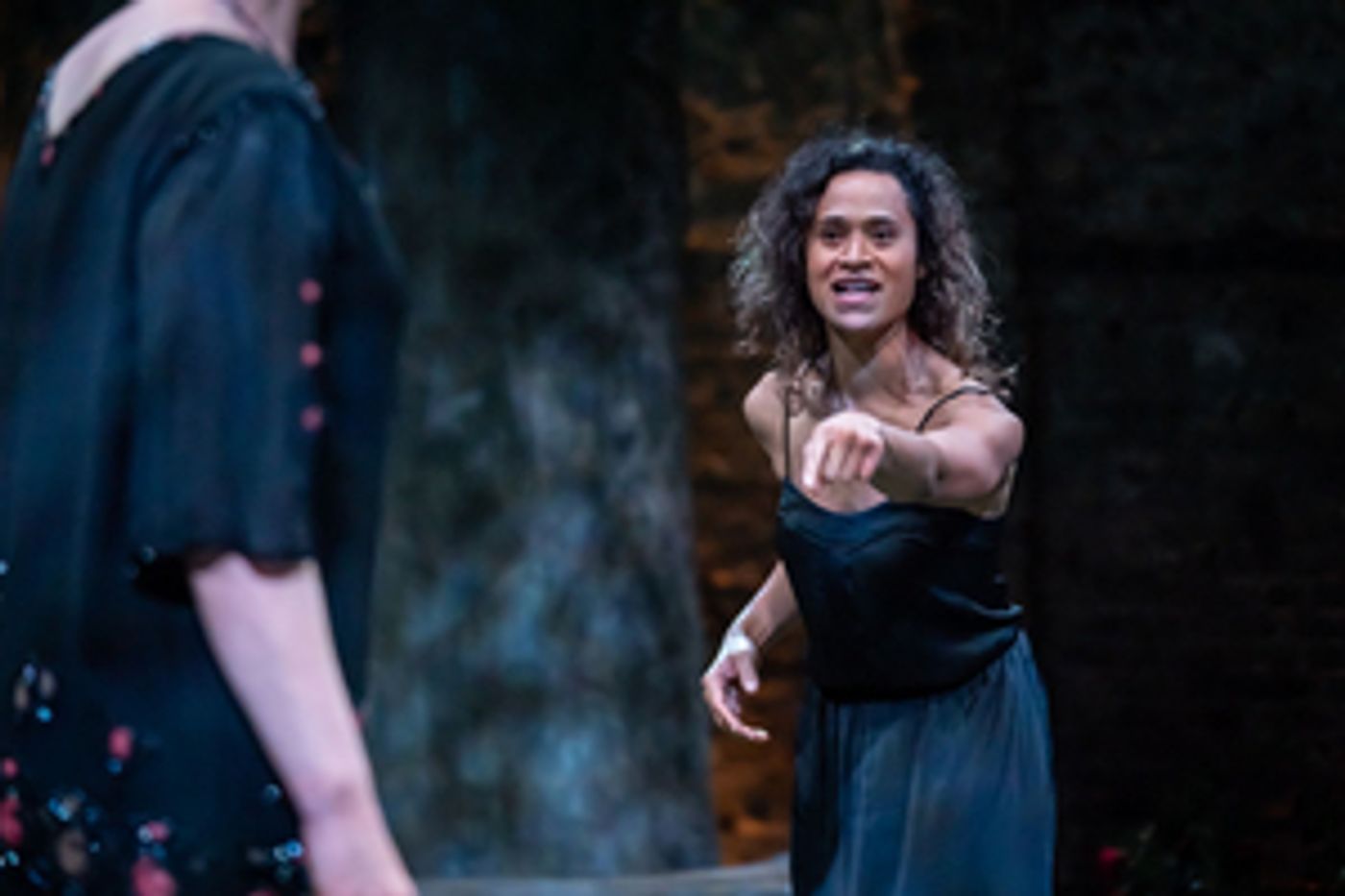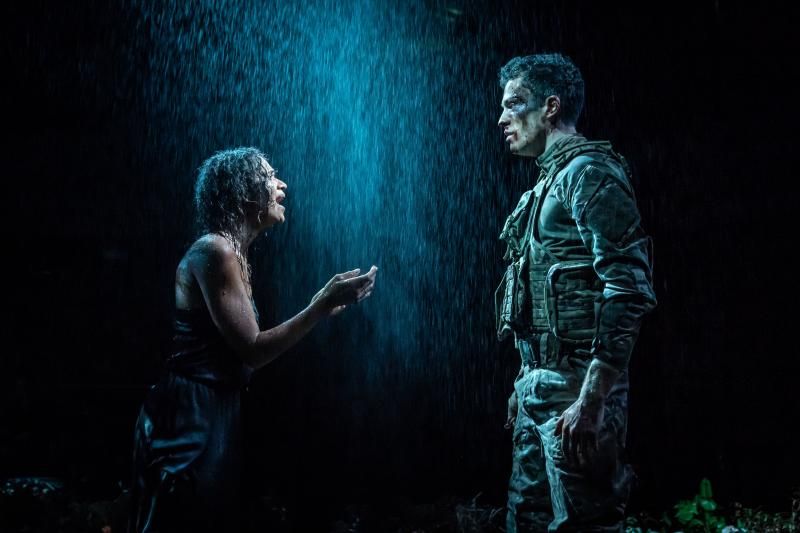Interview: Angel Coulby Talks ALBION On BBC Four
Mike Bartlett's play transfers from the Almeida Theatre to screen

After two successful runs at the Almeida Theatre, Mike Bartlett's production of Albion is being broadcast on BBC Four as part of their Culture in Quarantine series.
Angel Coulby, who plays Anna in the play, chats about her experiences joining the show's revival, how she's finding positivity in the pandemic, and how the show's themes are more relevant than ever before.
Albion first ran in 2017 and was such a huge success that it was revived in February this year. For those who haven't seen it, can you explain a little bit about what the show is about, and the role of your character Anna?
Albion is set in a garden in Oxfordshire. It's a big garden surrounding an old country house, and it's fallen into complete disrepair; it's been neglected for many years.
Early on in the play, you meet the main protagonist, Audrey, who used to visit the house as a child and has heard that it's fallen into disrepair and is hellbent on restoring it. So, she decides to sell up in London and move her family to Oxfordshire so she can bring this garden back from the brink.
I play Anna, who was the girlfriend of Audrey's now deceased son, James. Anna and James seemingly had a quite intense but relatively brief relationship. They were only together for three months before James died, and so she's kind of been adopted into the family.
She's still hanging around because after James died he was cremated, and there's still a discussion around what to do with the ashes - even though he died two years previously to this moment. Anna feels very strongly that she wants to be part of that; she wants to memorialise James, and she also feels like it's a way of keeping him alive if she can be a part of scattering the ashes and the decision of where they might do that.
Given the narratives in the play and the themes you've mentioned, would you say it's quite relevant to the current climate?
Yeah, 100%. A lot of people see it as a kind of Brexit metaphor, in the sense that Audrey in particular struggles to let go of the past and has this very romanticised image of how things were and wanting to get back to that. However, it ends up being quite detrimental to her present life and quite damaging for her. So in that sense it could be very relevant in terms of Brexit.
But also in terms of the planet, which is another theme mentioned in the play, about the climate and how that's changed and how it's important that we focus on working more globally together in order to combat problems such as this. I definitely think it's probably more relevant now than it was then.
What was the audience reaction when you originally performed it?
It's really interesting, because it's a thrust stage with a garden and lawned area surrounded by plants and beds around the edge, and the audience are really close to you. You're very, very aware of them the whole time because they're all around you.
There's quite emotional moments in the play, but also very amusing, very funny moments, so there was also a lot of laughter. There were four of us new to the play, who didn't perform the original piece two years ago, and we knew it was funny, but we didn't realise quite how funny it was until we got in front of an audience and there was a lot of raucous laughter - which was very encouraging.
As you've just mentioned, you were new to the play's revival. How did it feel to come into a show that had five-star reviews and a very successful run already? Did that put a lot of pressure on you and the other cast members who hadn't been in the original?
I certainly felt, initially before we started rehearsals, quite a lot of pressure. But everyone from the original cast was not only so supportive, but excited by the fresh blood coming in.
Also, it felt quite safe with a lot of the technical side of the play; because the passing of time is represented by the planting in the garden, we had to do that planting live. I hear that working out the choreography initially was quite intense and complicated, and they had that all down by the time we came in.
So we just had to follow instructions in that sense, and that was good. Although there was still the odd occasion when people would put their plants in the wrong bay, so you'd come to your bay and it would be full and you'd have to renegotiate the knock-on effect of that! Thankfully, that only happened a couple of times.
But generally, it was such a welcoming, warm cast. It was a great experience.

Wil Coban (James) in Albion
Was there a favourite scene or line from the show which you looked forward to in every performance?
There's a moment in the play where they're having a party and Audrey is a bit drunk. Anna and Audrey have a very tricky relationship, but Anna wants to be in Audrey's favour. However, Anna is a bit of a thorn in Audrey's side at the party because she's hanging around and she's not really from the world that Audrey is from - she's quite emotional, and is given to sudden changes of emotion and is very open about her grief. Whereas Audrey is trying to be much more contained and just wants to move on from it.
But there's a moment at the party where Audrey's talking about the drinks they're serving at the party, and she's talking about what they call twinkles, and she says, "You must have a twinkle!". And then later on in the play, Audrey says this to Anna, and Anna says, (impersonating Audrey) "Yes, seven twinkles!". I enjoy this one moment where I get to get at Audrey a little bit - it's always quite enjoyable and is a bit of a laugh, which is quite fun.
The show is written by renowned playwright Mike Bartlett. How did it feel to be in his production?
I've been wanting to work with Mike for a long time, in the same way that I've been wanting to work at the Almeida Theatre, so it was a double whammy in that sense. It was great - he was so lovely as well in rehearsals. He was there to help us along and he was rewriting a little bit as well throughout. It's just a privilege: his writing is fantastic, it's so naturalistic, funny and profound. It's a pleasure to be able to perform his work.
Do you think the production will feel different for audiences who are watching it for the first time on screen, rather than the stage?
Technically, they'll be able to see the characters speaking at all times. Because in the play, you have to be very careful about standing still at any point because you might end up giving one part of the audience your back for quite a long period of time. So, you needed to find a way to manoeuvre yourself around, so for large parts of the play they may miss bits of what you're doing.
When we filmed it, we had the benefit of going back and including close-ups and capturing those moments that might have been missed by some positions in the auditorium. I think it will translate really well because of the writing - it's so naturalistic and that works well on screen.
It was an interesting experience doing it, because although we were told to depict it in exactly the way we'd been doing so far in the run, it's confusing when you're supposed to be performing to an audience and also a bunch of cameras, because the style of acting is very different on camera.
We were able to go back and do pickups, so something that might have been too big for camera we were able to bring down. The final piece that's being shown on the BBC is created from two performances that we did, but also various pickups, so hopefully it's the ideal level for screen.
Do you have a preference between stage and screen when it comes to performing?
I don't actually. I've mostly been doing screen; it's just ended up working out like that. But it was really great to get back on the stage and do some live performance, because there's nothing like it really. I don't have a preference though - just good writing is what I look for.
The last few months has been a very weird time. How have you been coping?
We were really fortunate; we were up North with family before the lockdown happened. We sensed it was going to happen, so we stayed up there in the countryside. It's been very positive being with my immediate family - we've bonded even more and that's been really nice.
I guess overall, I retain a certain amount of hope, because I see it as an opportunity. We can take stock a bit, maybe slow down and stop and see how we can work to change and make the future better. I see it as a learning experience really.
I think I've been one of the lucky ones in this situation, it's been mainly positive for me. I haven't been closely affected by it or anything yet, I've been very fortunate. But I'm looking forward to getting back to work and seeing more people. I've got a two-and-a-half-year-old, so he's kept me very occupied throughout!
When the West End reopens, what show will you go and see first?
Oh, that's a really good question. I really wanted to see Uncle Vanya before it shut down, so if that reopened, I would go see that.
Why should people watch Albion on BBC Four?
It's an amazingly powerful piece about the state of the nation. I think it's utterly relevant, even more relevant now than it was when it was first performed. And also, I have to say, Victoria Hamilton's performance is fantastic, so that alone is worth seeing.
Albion will be broadcast on BBC Four on 16 August at 10.10pm, and is available on catch-up afterwards on BBC iPlayer
Photo: Marc Brenner

Videos


